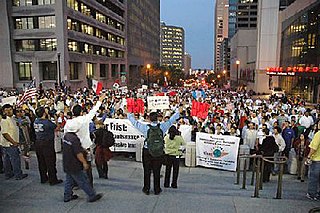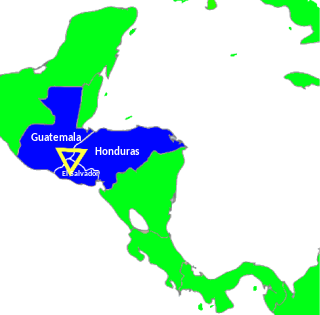
The United Farm Workers of America, or more commonly just United Farm Workers (UFW), is a labor union for farmworkers in the United States. It originated from the merger of two workers' rights organizations, the National Farm Workers Association (NFWA) led by César Chávez, Dolores Huerta, and Gilbert Padilla and the Agricultural Workers Organizing Committee (AWOC) led by organizer Larry Itliong. They allied and transformed from workers' rights organizations into a union as a result of a series of strikes in 1965, when the Filipino-American and Mexican-American farmworkers of the AWOC in Delano, California, initiated a grape strike, and the NFWA went on strike in support. As a result of the commonality in goals and methods, the NFWA and the AWOC formed the United Farm Workers Organizing Committee on August 22, 1966. This organization was accepted into the AFL–CIO in 1972 and changed its name to the United Farm Workers Union.

Mexican American history, or the history of American residents of Mexican descent, largely begins after the annexation of Northern Mexico in 1848, when the nearly 80,000 Mexican citizens of California, Nevada, Utah, Arizona, Colorado, and New Mexico became U.S. citizens. Large-scale migration increased the U.S.' Mexican population during the 1910s, as refugees fled the economic devastation and violence of Mexico's high-casualty revolution and civil war. Until the mid-20th century, most Mexican Americans lived within a few hundred miles of the border, although some resettled along rail lines from the Southwest into the Midwest.
Mixtec transnational migration is the phenomenon in which Mixtec people have migrated between Mexico and the United States for over three generations.
Founded in Madrid in 2001, Sociologists Without Borders/Sociólogos Sin Fronteras (SSF) is a Non-Governmental Organization that advances a cosmopolitan sociology and its activities are considered to be public sociology. The organization has active chapters in Brazil, Chile, Italy, Spain the U.S., Canada, and Iran. The Spanish and U.S. chapters each have international members. Each of the chapters has regular meetings and organizes sessions at national sociological conferences, and there is an affiliated online, peer-reviewed journal.

In 2006–2007, millions of people participated in protests over a proposed change to U.S. immigration policy. These large scale mobilizations are widely seen as a historic turning point in Latino politics, especially Latino immigrant civic participation and political influence, as noted in a range of scholarly publications in this field. The protests began in response to proposed legislation known as H.R. 4437, which would raise penalties for illegal immigration and classify illegal individuals and anyone who helped them enter or remain in the US as felons. As part of the wider immigration debate, most of the protests not only sought a rejection of this bill, but also a comprehensive reform of the country's immigration laws that included a path to citizenship for all illegal immigrants.

The Great American Boycott, also called the Day Without an Immigrant, was a one-day boycott of United States schools and businesses by immigrants in the United States which took place on May 1, 2006.
Illegal immigration, or unauthorized immigration, occurs when foreign nationals, known as aliens, violate US immigration laws by entering the United States unlawfully, or by lawfully entering but then remaining after the expiration of their visas, parole or temporary protected status.
Illegal immigration is the migration of people into a country in violation of that country's immigration laws, or the continuous residence in a country without the legal right to do so. Illegal immigration tends to be financially upward, with migrants moving from poorer to richer countries. Illegal residence in another country creates the risk of detention, deportation, and other imposed sanctions.
Elvira Arellano is an international activist who works to defend the human rights of immigrants living in the U.S. without legal authorization.
No More Deaths is an advocacy group based in Tucson and Phoenix, Arizona, United States. The group's stated goal is to end the series of fatalities of undocumented immigrants crossing the desert regions near the Mexico–United States border. Volunteers for the organization provide food, water, and medical aid to people crossing the US-Mexico border through the Arizona desert and offer humanitarian aid to people in Mexico who have been deported from the US.

The Nationalist Front of Mexico, formerly known as the Organization for the National Will and the National Mexicanist Front, is a neo-fascist activist organization in Mexico.
Malaquías Montoya is an American-born Chicano poster artist who is known as a major figure in the Chicano Art Movement of the 1960s and 1970s.
The National Day Laborer Organizing Network (NDLON) is an American labor organization which aims at improving the lives of day laborers. It was founded in Northridge, California, in July 2001 and is based in Los Angeles, California. NDLON as a direct democracy where day laborers in member organizations vote directly for the policies at NDLON's biannual assemblies. NDLON started with 12 community-based organizations and has grown to 36 member organizations.
Illegal immigration in Mexico has occurred at various times throughout history, especially in the 1830s and since the 1970s. The largest source of illegal immigrants in Mexico are the impoverished Central American countries of Guatemala, Haiti, Honduras, and El Salvador and African countries like Democratic Republic of Congo, Cameroon, Guinea, Ghana and Nigeria. The largest single group of illegal immigrants in Mexico is from the United States.

The 2014 American immigration crisis was a surge in unaccompanied children and women from the Northern Triangle of Central America (NTCA) seeking entrance to the United States in 2014. According to U.S. law, an unaccompanied alien child refers to a person under 18 years of age, who has no lawful immigration status in the U.S., and who does not have a legal guardian to provide physical custody and care.

Border Angels is a San Diego–based 501(c)(3) tax-exempt nonprofit charitable organization that is focused on migrant rights, immigration reform, and the prevention of immigrant deaths along the border. Border Angels, along with its more than 2000 volunteers serves San Diego County's immigrant population through various migrant outreach programs such as day laborer outreach and legal assistance, and provides life-saving assistance for migrants by placing bottled water in remote mountain and desert border regions of the San Diego and Imperial counties, California.
Many people migrating from Latin America to the United States are victims of sexual assault and sex trafficking in Mexico. People who migrate through or from Mexico without legal permission must enter into dealings with smugglers and, often, criminal gangs. Perpetrators may be smugglers or gang members, but can also be government officials, bandits, or other migrants. Sexual assault is sometimes part of the "price" of smuggling, and some women have reported preparing for it in advance by taking contraception.

Central American migrant caravans, also known as the Viacrucis del migrante, are migrant caravans that travel from Central America to the Mexico–United States border to demand asylum in the United States. The largest and best known of these were organized by Pueblo Sin Fronteras that set off during Holy Week in early 2017 and 2018 from the Northern Triangle of Central America (NTCA), but such caravans of migrants began arriving several years earlier, and other unrelated caravans continued to arrive into late 2018.

Helena Maleno Garzón is a Spanish-Moroccan human rights defender, journalist, researcher, documentalist and writer. She is specialist in the migration and trafficking in human beings, Doctor Honoris Causa from the University of Illes Balears. She is the Founder & CEO of Caminando Fronteras / Walking Borders.
The Binational Front of Indigenous Organizations, formerly the Binational Front of Mixteco-Zapotec, emerged in 1991 in Los Angeles, California. The FIOB was founded off of six Oaxacan migrant organizations – the Mixtec Popular Civic Committee, the Organization of the Exploited and Oppressed People, Committee from Tlacolula in Los Angeles, Organization Pro-Support for Macuiltianguis, Benito Juárez Civic Association, and the Regional Organization from Oaxaca. The organization is an indigenous migrant advocacy group in California, active in Los Angeles, Fresno, and Santa Maria with an office in Juxtlahuaca, Oaxaca.








